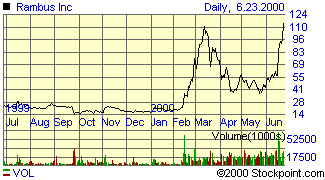Pantagruel schrijft: "De Jongens bij EbNews hebben een artikeltje met dat waar ik al bang voor was. Rambus Inc. gaat inderdaad hun patent gebruiken om de SDRAM producenten naar de kassa te krijgen. Zou het dan toch een door berekenen van de royalties gaan worden wat de prijs ook nog eens omhoog drijft":
Emboldened by a stunning settlement with Hitachi Ltd., Rambus Inc. is using its new-found clout in the area of patent enforcement to negotiate royalty agreements with the rest of the industry's DRAM makers-particularly those pushing DDR SDRAM.
The legal masterstroke, which could set the stage for Rambus to exact fees from a variety of DRAM and logic-IC makers that use a synchronous memory interface, has set the semiconductor industry on its ear. Refining the scope of its patent claim, Rambus said it is choosing for now to focus on SDRAM, DDR (double-data-rate) SDRAM, and logic controllers. While not a primary target, that would appear to include the new wave of microprocessors coming from the likes of Intel, Sega, Transmeta, and Via Technologies, each of which uses a direct interface to synchronous memory.[break]Het natuurlijk minder fijne voor ons consumenten:[/break]"It would add another layer of royalties on commodity chips that already often suffer from razor-thin margins," said Dan Scovel, an analyst at Needham & Co. Inc., New York. "If companies pass on the cost of any new royalties on SDRAMs, their customers are going to face higher prices."[break]En over de deals met Hitachi en Toshiba:[/break]Kanadjian responded to analysts' speculation that Hitachi and Toshiba received "sweetheart" royalty terms that will likely pressure other DRAM manufacturers to the bargaining table. "There is no such thing as a standard licensing agreement," he said. "Each company's case is different. Hitachi and Toshiba have different licensing terms, and new agreements may well have different terms."
Door deze berichten heeft het aandeel Rambus een grote vlucht genomen:
 |
.
